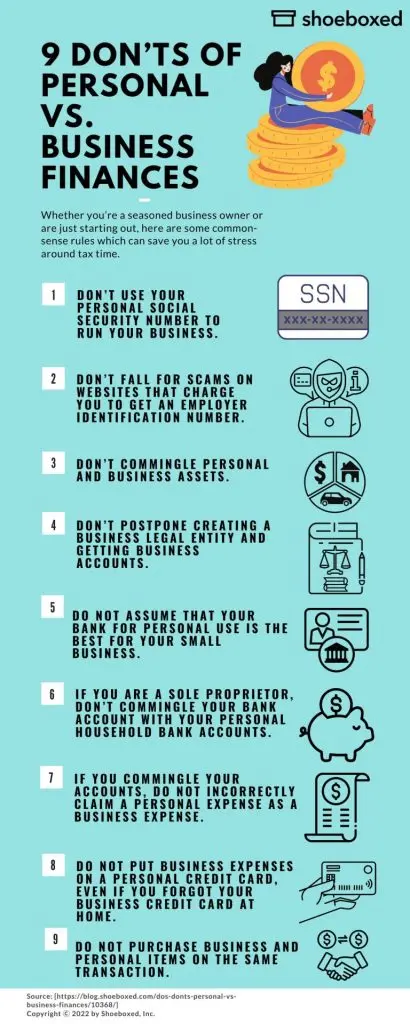With tax season just around the corner, it’s a good time for a quick refresher on separating your personal expenses from your business expenses.
Whether you’re a seasoned business owner or are just starting out, here are some common rules which can save you a lot of stress around tax time.
See also: Small Business Tax Strategies: A Step-by-Step Guide for 2022
6 do’s and 9 don’t of personal vs. business finances
Do…
1. Apply for an Employer Identification Number (EIN) at IRS.gov.
2. Register a legal business name.
3. Get a business entity for legal and financial protection. (*Note – A sole proprietorship is NOT a legal entity.)
4. Open the following and use for ONLY business purchases and deposits: One business checking account for business expenses; two business savings accounts for 1) tax savings and 2) future savings/investment purchases; and a business credit card. With these accounts, you’ll have a better chance of getting business-based financing, such as a SBA loan. But if you’re not sure what type of loan you need, you could use a tool like AdvancePoint Capital.
5. By using only your business accounts to pay for business expenses, you only need to track receipts for those accounts. It is much easier to manage and trace expenses to receipts, and not overlook an expense or receipt when there is a dedicated business bank account.
6. Have a good process and filing system for storing receipts for all those business expenses.
Never lose a receipt again 📁
Join over 1 million businesses scanning receipts, creating expense reports, and reclaiming multiple hours every week—with Shoeboxed.✨
Get Started TodaySee also: What Are the Five Foundations of Personal Finance?
Don’t…
1. Don’t use your personal social security number to run your business. Protect your identity!
2. Don’t fall for scams on emails or websites that charge you to get an Employer Identification Number. EINs are free at IRS.gov.
3. Don’t commingle personal and business assets. DO NOT commingle the money.
4. Don’t postpone creating a business legal entity and getting business accounts just because you are in the initial phases of the business and you aren’t making that much money yet.
5. Do not assume that your bank for personal use is the best for your small business. Often, community banks have lower fees and minimum balance compared to large, national banks.
6. If you are a sole proprietor (which I don’t recommend), don’t commingle that with your personal household bank accounts. It will be too hard to try to go through and find business-related expenses later at tax time. Also, in the event of an audit, you’ll be opening all your personal transactions for review by the IRS.
See also: LLC vs. LLP vs. Sole Proprietorship: Choosing a Business Structure and Why It Matters
LYFE Accounting provides some helpful tips to avoid the IRS audit in this video.7. If you commingle your accounts, DO NOT incorrectly claim a personal expense as a business expense. If you are audited by the IRS and found to have paid fewer taxes than you owed, you will pay a penalty and interest calculated from the time that you should have paid taxes…which could be as far back as three to five years! Similarly, if you don’t have a good process and file system for receipts and can’t provide a receipt during an IRS audit, then you forfeit your tax deductions and will pay penalties and interest fines.
8. Do not put business expenses on a personal credit card, even if you’ve forgotten your business credit card at home. Doing this can result in you missing out on valuable tax deductions if you forget to track and tell your CPA. Do not forget to give all your applicable business expenses to your CPA at tax time. If you forget and try to submit expenses after they’ve already completed your taxes, you spend more money for tax preparation fees…calculated anywhere from $150 – $400 per hour!
9. Do not purchase business and personal items on the same transaction. Everything should be separated and the corresponding credit card should be used. Doing that, your business receipts and records will be clean and only contain items related to business activities.
Sylvia Inks is a financial coach and speaker, specializing in helping small business owners save time, and money, and reduce stress in running their businesses. Sylvia leverages her ten years of experience working with one of the world’s largest consulting firms and helping Fortune 500 organizations in financial services, insurance, healthcare, and technology, to now help entrepreneurs improve processes, performance, and profitability. Her clients say she’s energetic, compassionate, and jargon-free for the finance-a- phobes. Her clients appreciate the hope and clear direction that she provides in coaching. For more information, visit www.SMIFinancialCoaching.com and www.SmallBusinessFinanceBook.com.
Turn receipts into data with Shoeboxed ✨
Try a systematic approach to receipt categories for tax time. Try free for 30 days!
Get Started TodayMore frequently asked questions about personal vs. business finances, answered by the Shoeboxed team!
What does the IRS consider personal expenses?
According to the IRS, the following five essential groups are considered personal and necessary expenses:
1. Personal care products and services
2. Apparel and services
3. Food
4. Housekeeping supplies
5. Miscellaneous
What personal expenses can I write off?
Here is a list of 7 common personal expenses that are eligible as a tax write-off:
1. Education expenses such as tuition fees or book purchases
2. Mortgage interest
3. 401(k) and IRA contributions
4. Student loan interest
5. Charitable contributions
6. Medical expenses and health savings accounts (HSA)
7. State and local taxes
What business deductions can I claim without receipts?
You can use other documentation if you don’t have the original receipts for a certain purchase. This can consist of debit and credit card statements, electronic versions of the receipt, canceled checks, written records of some sort, scanned images, and notes in a calendar. The first crucial step is to review your bank statements and look for the purchase of the item you want to deduct.
Why should you avoid using a business account for personal use?
You could face legal and financial problems when using your business bank account for your expenses. If your business is a corporation or limited liability company (LLC), your assets are guarded against professional liabilities if your business does not succeed or faces legal charges. However, you can lose that security if you use your business account to pay for personal expenses.
What are the differences between personal vs. business accounts?
A business bank account is where business owners can safely and conveniently store their earnings and draw from to pay for business expenses. Whereas, personal bank accounts are not meant to be used for business purposes. Whichever type of account you require, it’s important to weigh up all of the options available to you, as there are many providers eager to have you as a customer. A platform like Compare Accounts offers an efficient way of doing this, and also makes the process of opening an account straightforward.
Can I use a business account for personal expenses?
You must separate your personal and business expenses if you’re running a business. By using a business account for personal expenses, you can cause various legal, operational, and tax difficulties.
A solution to this problem is to have a business bank card that pays for your business purchases and operating expenses. You can easily monitor expenses by connecting the card to your business bank account. After operating with a business card for a period, you will receive a bank statement summarizing all the expenses for that timespan. This is a great method to track your spending and ensure that you stay within your budget. Then, you can integrate these accounts with your records and ledgers.
Bonus infographic: 9 don’ts of personal vs. business finances

The bottom line
It’s a good idea to know how to distinguish between personal and company costs. For more tips on small business finances, check out our Shoeboxed blog for articles on tax filing preparation, small business operations, commonly missed tax deductions, and personal finance management. Want to brush up on bookkeeping terms? Check out our mammoth list of 45+ bookkeeping resources that will help you hone your bookkeeping skills.
About Shoeboxed!
Shoeboxed is a receipt scanning service with receipt management software that supports multiple methods for receipt capture: send, scan, upload, forward, and more!
You can stuff your receipts into one of our Magic Envelopes (prepaid postage within the US). Use our receipt tracker + receipt scanner app (iPhone, iPad and Android) to snap a picture while on the go. Auto-import receipts from Gmail. Or forward a receipt to your designated Shoeboxed email address.
Turn your receipts into data and deductibles with our expense reports that include IRS-accepted receipt images.
Join over 1 million businesses scanning & organizing receipts, creating expense reports and more—with Shoeboxed.
Try Shoeboxed today!



